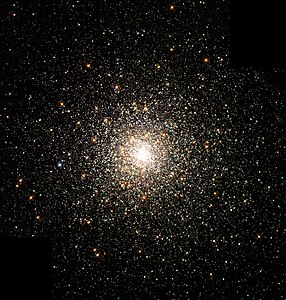What does metallicity mean?
Definitions for metallicity
metal·lic·i·ty
This dictionary definitions page includes all the possible meanings, example usage and translations of the word metallicity.
Did you actually mean metallized dye or medallist?
Wiktionary
metallicitynoun
The abundance of elements heavier than helium in stars as a result of nucleosynthesis
Wikipedia
Metallicity
In astronomy, metallicity is the abundance of elements present in an object that are heavier than hydrogen and helium. Most of the normal physical matter in the Universe is either hydrogen or helium, and astronomers use the word "metals" as a convenient short term for "all elements except hydrogen and helium". This word-use is distinct from the conventional chemical or physical definition of a metal as an electrically conducting solid. Stars and nebulae with relatively high abundances of heavier elements are called "metal-rich" in astrophysical terms, even though many of those elements are nonmetals in chemistry. The presence of heavier elements hails from stellar nucleosynthesis, where the majority of elements heavier than hydrogen and helium in the Universe (metals, hereafter) are formed in the cores of stars as they evolve. Over time, stellar winds and supernovae deposit the metals into the surrounding environment, enriching the interstellar medium and providing recycling materials for the birth of new stars. It follows that older generations of stars, which formed in the metal-poor early Universe, generally have lower metallicities than those of younger generations, which formed in a more metal-rich Universe. Observed changes in the chemical abundances of different types of stars, based on the spectral peculiarities that were later attributed to metallicity, led astronomer Walter Baade in 1944 to propose the existence of two different populations of stars. These became commonly known as Population I (metal-rich) and Population II (metal-poor) stars. A third stellar population was introduced in 1978, known as Population III stars. These "extremely metal-poor" (XMP) stars are theorized to have been the "first-born" stars created in the Universe.
Wikidata
Metallicity
In astronomy and physical cosmology, the metallicity of an object is the proportion of its matter made up of chemical elements other than hydrogen and helium. Since stars, which comprise most of the visible matter in the universe, are composed mostly of hydrogen and helium, astronomers use for convenience the blanket term "metal" to describe all other elements collectively. Thus, a nebula rich in carbon, nitrogen, oxygen, and neon would be "metal-rich" in astrophysical terms even though those elements are non-metals in chemistry. This term should not be confused with the usual definition of "metal"; metallic bonds are impossible within stars, and the very strongest chemical bonds are only possible in the outer layers of cool K and M stars. Earth-like chemistry therefore has little or no relevance in stellar interiors. The metallicity of an astronomical object may provide an indication of its age. When the universe first formed, according to the Big Bang theory, it consisted almost entirely of hydrogen which, through primordial nucleosynthesis, created a sizeable proportion of helium and only trace amounts of lithium and beryllium and no heavier elements. Therefore, older stars have lower metallicities than younger stars such as our Sun.
Numerology
Chaldean Numerology
The numerical value of metallicity in Chaldean Numerology is: 3
Pythagorean Numerology
The numerical value of metallicity in Pythagorean Numerology is: 3
Popularity rank by frequency of use
Translation
Find a translation for the metallicity definition in other languages:
Select another language:
- - Select -
- 简体中文 (Chinese - Simplified)
- 繁體中文 (Chinese - Traditional)
- Español (Spanish)
- Esperanto (Esperanto)
- 日本語 (Japanese)
- Português (Portuguese)
- Deutsch (German)
- العربية (Arabic)
- Français (French)
- Русский (Russian)
- ಕನ್ನಡ (Kannada)
- 한국어 (Korean)
- עברית (Hebrew)
- Gaeilge (Irish)
- Українська (Ukrainian)
- اردو (Urdu)
- Magyar (Hungarian)
- मानक हिन्दी (Hindi)
- Indonesia (Indonesian)
- Italiano (Italian)
- தமிழ் (Tamil)
- Türkçe (Turkish)
- తెలుగు (Telugu)
- ภาษาไทย (Thai)
- Tiếng Việt (Vietnamese)
- Čeština (Czech)
- Polski (Polish)
- Bahasa Indonesia (Indonesian)
- Românește (Romanian)
- Nederlands (Dutch)
- Ελληνικά (Greek)
- Latinum (Latin)
- Svenska (Swedish)
- Dansk (Danish)
- Suomi (Finnish)
- فارسی (Persian)
- ייִדיש (Yiddish)
- հայերեն (Armenian)
- Norsk (Norwegian)
- English (English)
Word of the Day
Would you like us to send you a FREE new word definition delivered to your inbox daily?
Citation
Use the citation below to add this definition to your bibliography:
Style:MLAChicagoAPA
"metallicity." Definitions.net. STANDS4 LLC, 2024. Web. 25 Apr. 2024. <https://www.definitions.net/definition/metallicity>.



Discuss these metallicity definitions with the community:
Report Comment
We're doing our best to make sure our content is useful, accurate and safe.
If by any chance you spot an inappropriate comment while navigating through our website please use this form to let us know, and we'll take care of it shortly.
Attachment
You need to be logged in to favorite.
Log In